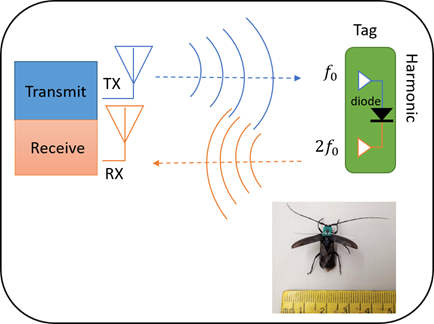Theme: | Sensing/Signal Processing |
Application: | Radar/wildlife tracking |
Contact Person: | |
External collabolator: | Wireless Research Centre, University of Canterbury, New Zealand |
Intorduction: | Harmonic radar (HR) is a type of non-linear radar that uses passive transponder tags to create a harmonic response from a target that would otherwise be unlikely to produce a distinguishable radar response on its own. It’s used in such applications as wildlife tracking, wearable sensors, and industrial monitoring. A typical harmonic tag is a passive battery-less transponder that consists of a non-linear element, such as a low-voltage diode, attached to an antenna/s that is tuned to the fundamental transmission frequency and its second harmonic. The diode absorbs the energy of the signal received by the antenna and produces its replica at the double frequency, which is then re-transmitted and detected at the HR receiver.
|
Description: | This project aims at investigating fundamental trade-offs in operation of harmonic transponder tags. It includes evaluating harmonic tag performance in circuit/EM modeling software under varying input conditions, followed by practical manufacture and lab testing of the tags at different operating frequencies. |
Requirements: | You are a motivated student looking for a Bachelor thesis topic in the field of radio systems. You have interest in practically-oriented work, have basic knowledge of antenna and circuit modelling, and enjoy working in the lab environment. |
Additional Info |

